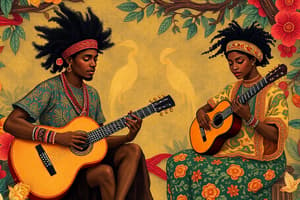Podcast
Questions and Answers
What is the primary purpose of music in traditional African society?
What is the primary purpose of music in traditional African society?
- Entertainment
- Ceremonial rites
- Communication
- All of the above (correct)
What is Afrobeat?
What is Afrobeat?
A fusion of West African and Black American music.
Juju music is primarily influenced by traditional Yoruba rhythms.
Juju music is primarily influenced by traditional Yoruba rhythms.
True (A)
Describe Apala music.
Describe Apala music.
Which of the following instruments is used in Apala music?
Which of the following instruments is used in Apala music?
Kwassa kwassa is a dance style that originated in ______.
Kwassa kwassa is a dance style that originated in ______.
Jive is a type of music that originated in Nigeria.
Jive is a type of music that originated in Nigeria.
What is the characteristic feature of Marabi music?
What is the characteristic feature of Marabi music?
What is the main musical influence on Jit music?
What is the main musical influence on Jit music?
Flashcards are hidden until you start studying
Study Notes
Music of Africa
- African music is a vital part of everyday life for African people.
- It is used for work, religion, ceremonies, and communication.
- Singing, dancing, hand clapping, and drumming are crucial elements in various ceremonies, such as births, deaths, initiations, marriages, and funerals.
- Music and dance are also vital in religious expressions and political events.
- African music has greatly influenced global music styles, especially in contemporary American, Latin American, and European music.
- The rhythmic structures and spiritual characteristics of African music are significant to developing unique jazz forms.
Traditional Music of Africa
- African Traditional music serves practical purposes, often used in ceremonial rites like birth, death, marriage, succession, worship, and spirit invocations.
- Some music has work-related or social functions, while others, in many traditional societies, serve as entertainment.
- The interlocking structural format of African music arises from its overlapping and dense texture, as well as complex rhythms.
Afrobeat
- Afrobeat is a music genre that blends West African and Black American music.
Apala
- Apala is a musical genre originating from Nigeria, influenced by the Yoruba tribe.
- It's used to wake up worshippers after fasting during Ramadan.
- Instruments used in Apala include the rattle (sekere), thumb piano (agidigbo), bell (agogo), and two or three talking drums.
Axe
- Axe is a popular musical style from Salvador, Bahia, and Brazil.
- It combines Afro-Caribbean styles like the marcha, reggae, and calypso.
- Axe is performed by carnival bands.
Jit
- Jit is a fast-paced and intense percussive dance music from Zimbabwe.
- It features drums with guitar accompaniment, heavily influenced by mbira-based guitar styles.
Jive
- Jive is a popular South African music genre known for its lively and uninhibited variation of the jitterbug, a swing dance form.
Juju
- Juju is a popular music style from Nigeria rooted in traditional Yoruba rhythms.
- Although the instruments used are more Western in origin, drums, keyboards, pedal steel guitar, and accordion are common, along with the traditional chon-dun (talking or squeeze drum).
Kwassa Kwassa
- Kwassa Kwassa is a dance style that originated in Zaire in the late 1980s.
- It was popularized by Kanda Bongo Man.
- This dance style involves hip movements back and forth, with arms following the hips.
Marabi
- Marabi is a South African three-chord township music genre popular in the 1930s-1960s.
- It evolved into African jazz.
- The keyboard style of Marabi blends American jazz, ragtime, and blues with African origins.
- Characterized by simple chords in varying patterns and repetitive harmony over extended periods to allow for more dance time.
Studying That Suits You
Use AI to generate personalized quizzes and flashcards to suit your learning preferences.




